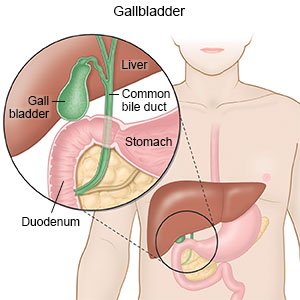Biliary Colic
Medically reviewed by Drugs.com. Last updated on Aug 4, 2025.
Biliary colic is severe pain in your upper abdomen caused by a gallbladder problem. Your gallbladder stores bile, which helps break down the fats that you eat.
 |
DISCHARGE INSTRUCTIONS:
Medicines:
- Medicines can help decrease pain and muscle spasms. You may also need medicine to calm your stomach and stop vomiting.
- Take your medicine as directed. Contact your healthcare provider if you think your medicine is not helping or you have side effects. Tell him if you are allergic to any medicine. Keep a list of the medicines, vitamins, and herbs you take. Include the amounts, and when and why you take them. Bring the list or the pill bottles to follow-up visits. Carry your medicine list with you in case of an emergency.
Avoid alcohol:
Alcohol can damage your gallbladder and make your symptoms worse.
Maintain a healthy weight:
Ask your healthcare provider how much you should weigh. Ask him to help you create a weight loss plan if you are overweight.
Related medications
Treatment options
The following list of medications are related to or used in the treatment of this condition.
Eat a variety of healthy foods:
Healthy foods include fruits, vegetables, whole-grain breads, low-fat dairy products, beans, lean meats, and fish. Foods that are high in fiber and low in fat and cholesterol may decrease your symptoms. Ask if you need to be on a special diet.
Exercise:
Ask your healthcare provider about the best exercise plan for you. Exercise may help improve your symptoms.
Follow up with your healthcare provider as directed:
Bring a list of any questions you have so you remember to ask them during your visits.
Contact your healthcare provider if:
- You have a fever.
- Your pain gets worse, even after you take medicine.
- You have nausea or are vomiting.
- Your skin or eyes are yellow.
- You have questions or concerns about your condition or care.
Return to the emergency department if:
- You have severe pain.
- You feel like you are going to faint.
- You are short of breath.
© Copyright Merative 2025 Information is for End User's use only and may not be sold, redistributed or otherwise used for commercial purposes.
The above information is an educational aid only. It is not intended as medical advice for individual conditions or treatments. Talk to your doctor, nurse or pharmacist before following any medical regimen to see if it is safe and effective for you.
Learn more about Biliary Colic
Treatment options
- Medications for Acute Abdomen
- Medications for Biliary Obstruction
- Medications for Cholangitis
- Medications for Cholelithiasis with Obstruction
- Medications for Gallbladder Disease
- Medications for Gallstones
Care guides
Symptoms and treatments
Further information
Always consult your healthcare provider to ensure the information displayed on this page applies to your personal circumstances.
